Some cool automotive wire images:
Image from page 878 of "Automotive industries" (1899) 
Image by Internet Archive Book Images Identifier: automotiveindust44phil Title: Automotive industries Year: 1899 (1890s) Authors: Subjects: Automobiles Aeronautics Publisher: Philadelphia [etc.] Chilton [etc.] View Book Page: Book Viewer About This Book: Catalog Entry View All Images: All Images From Book Click here to view book online to see this illustration in context in a browseable online version of this book. Text Appearing Before Image: idered to be applicable in practice. So far as practical considerations are concerned therate of burning can be reduced, and at the same timestable conditions of running can be maintained, only byworking on the rich side of the range. Under these con-ditions, however, the power output and economy ceaseto rise with increase of compression because the timeof ignition or the mixture strength is no longer the mostfavorable. By further enriching the mixture and re-tarding the ignition, the compression can be increasedto as high as 5.4:1, but, of course, only at great sacrificeof economy. The m.e.p. and thermal efficiency curvesobtained from such a test are shown in Fig. 2. It will be observed that, although the first indicationsof detonation occurred with a compression ratio of about4.75:1, it is possible by suitable adjustments of the mix-ture strength and ignition timing to raise the compres-sion to as high as 5.4:1 without allowing the detonation 60 P55 ua 50 40 35 4 0 50 55 GO 65 70 75 Text Appearing After Image: Note About Images Please note that these images are extracted from scanned page images that may have been digitally enhanced for readability - coloration and appearance of these illustrations may not perfectly resemble the original work.
Image from page 284 of "The economics of petroleum" (1921) 
Image by Internet Archive Book Images Identifier: economicsofpetro00pogu Title: The economics of petroleum Year: 1921 (1920s) Authors: Pogue, Joseph E. (Joseph Ezekiel), b. 1887 Subjects: Petroleum industry and trade Petroleum Publisher: New York : John Wiley & sons, inc. [etc., etc.] View Book Page: Book Viewer About This Book: Catalog Entry View All Images: All Images From Book Click here to view book online to see this illustration in context in a browseable online version of this book. Text Appearing Before Image: vigorous in the warmmonths than in the winter. Calculations based on monthly data forthe eight-year period, 1913-1920, yield the following index numbersrepresenting the average variations of seasonal origin: Table 114.â€"Index Numbers Showing the Seasonal Variations in theProduction of Crude Petroleum, Based on the Years, 1913-1920 January February March April 99.1 91.3 102.4 99.8102.0101.9 July 105.1 103.7 98.7 101.696.598.2 100 August September October November December Average. . . May June January, 1919; E. E. Day, An Index of the Physical Volume of Production,ibid., September, October, November and December, 1920. COMPARISON OF CORRECTED CURVES BY YEARS 261 Comparison of Corrected Curves by Years.â€"In order to concen-trate the results given above, with a view to eliminating all details,the yearly production, consumption, and price of crude petroleumfor the period 1913-1920 were recalculated and the secular trendremoved. The results were then plotted in Fig. 128, which shows the Text Appearing After Image: Fig. 128.â€"Production, consumption, and average price of crude petroleum inthe United States by years, 1913-1920, corrected so as to show the deviationsfrom the normal rate of increase. relative fluctuations of the three items from normal. While a math-ematical treatment of this land must be interpreted with caution, thechart would tend to indicate that in 1920 price advanced 30 per centhigher than was necessary and led to a production of some 35 milhonbarrels of crude oil in excess of the quantity actually needed. CHAPTER XIX THE BEARING OF AUTOMOTIVE TRANSPORTATION UPONTHE OIL INDUSTRY There is no industrial parallel to the growth in output of pas-senger cars, trucks and tractors in the United States during the pastten years. The expansion of automotive transportation is one ofthe remarkable features of the twentieth century. The number ofcars, trucks and tractors produced annually in the United Statesfrom 1910 to 1920 is shown in Table 115. The approximate number of motor vehicles Note About Images Please note that these images are extracted from scanned page images that may have been digitally enhanced for readability - coloration and appearance of these illustrations may not perfectly resemble the original work.



